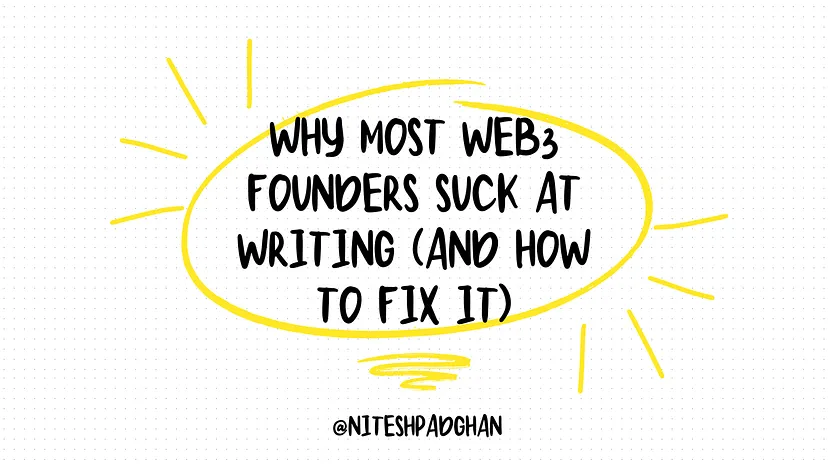Great Ideas. Bad Writing. A Common Founder Problem.
You’ve got the tech. The vision. The groundbreaking idea that can reshape industries.
But when it comes to telling people about it? Suddenly, it feels like you’re trying to explain quantum physics to a 5-year-old.
You’re not alone. Most founders suck at writing. Not because they’re bad at what they do, but because writing is a different beast altogether.
The good news? It doesn’t have to stay that way. Here’s why writing feels so hard — and how to get better at it without losing your mind.
Why Founders Struggle with Writing
1. You’re Too Close to the Product
When you’ve been building your project for months or years, it’s hard to step back and explain it in plain English.
Your brain is wired to think in features, tech stacks, and functionalities. But your audience — whether they’re investors, users, or partners — doesn’t care about the tech. They care about how it helps them.
The Fix:
Start with the “Why” and the “So what?”
- Why does this product exist?
- So what if it has XYZ features? How does it make someone’s life better?
Write like you’re explaining your product to a smart 10-year-old. If they get it, everyone will.
2. You’re Drowning in Jargon
In Web3, it’s easy to fall into the jargon trap. DeFi protocols, zk-SNARKs, consensus mechanisms — you’re fluent in these terms. But to your audience, jargon is like trying to read another language.
Jargon doesn’t make you sound smarter. It makes you sound inaccessible.
The Fix:
Use simple language and real-world examples.
Instead of: “We’re building a decentralized protocol using Layer 2 solutions for faster scalability.”
Try: “We’re making blockchain faster and cheaper, so more people can use it.”
Simplify. Your goal is to connect, not confuse.
3. You Write Like a Tech Manual
Founders often write like they’re documenting their product for developers: cold, dry, and technical.
But the best writing isn’t just informative — it’s human. It makes people feel something.
The Fix:
Write stories, not specs.
- Talk about why you started the project.
- Share the problem you’re solving.
- Explain how your product helps people in real life.
Stories stick. Specs don’t.
4. You’re Trying to Sound ‘Professional’
You think professional writing means long sentences, big words, and sounding like a textbook.
It doesn’t.
In fact, writing that’s too “professional” is often boring and forgettable.
The Fix:
Be conversational. Be you.
Imagine you’re talking to someone over coffee. How would you explain your idea? Write like that.
Professional doesn’t mean stiff. It means clear, honest, and engaging.
5. You’re Not Clear on Your Audience
Who are you writing for? Investors? Users? Developers? Each audience cares about different things.
If you’re not clear on who you’re talking to, your writing will feel scattered.
The Fix:
Before you write, ask:
- Who am I writing this for?
- What do they care about?
- What do I want them to do after reading this?
Writing with a specific person in mind makes your message sharper and more impactful.
Quick Wins to Improve Your Writing (Today)
You don’t need to become a Pulitzer-winning writer overnight. Here are a few quick wins that can make a big difference, fast.
1. Start with the Hook
The first line of your writing needs to grab attention. Think of it like the subject line of an email. If it doesn’t hook them, they won’t read the rest.
Example:
- “Most Web3 projects fail not because of bad tech, but because of bad storytelling.”
Make them want to keep reading.
2. Keep It Short
Long blocks of text are intimidating. Break your writing into short paragraphs and snappy sentences.
Tip:
- If a sentence has more than 20 words, see if you can split it.
- If a paragraph is longer than 3–4 lines, break it up.
Your readers (and their eyes) will thank you.
3. Use the Power of “You”
When you write “you,” it feels like you’re talking directly to the reader. It makes your writing more personal and engaging.
Compare:
- Bad: “Web3 founders often struggle with storytelling.”
- Better: “If you’re a Web3 founder, you know how hard storytelling can be.”
Speak to them, not about them.
4. End with a Call to Action
What do you want the reader to do next? Visit your website? Book a call? Follow you?
Always end with a clear call to action (CTA).
Example:
- “Want help turning your Web3 idea into a story that sticks? Let’s chat.”
Or… Just Get a Ghostwriter
Here’s the truth: Writing is a skill. And like any skill, it takes time, practice, and patience to master.
But as a founder, your time is your most valuable resource.
That’s where a ghostwriter comes in.
A good ghostwriter can:
- Take your ideas and turn them into stories people care about.
- Help you build trust, authority, and influence.
- Free up your time to focus on what you do best: building your vision.
If you’re ready to stop struggling with words and start connecting with your audience, a ghostwriter might be your secret weapon.
Final Thought
You don’t suck at writing because you’re not smart. You suck at writing because you’ve been too busy building to spend time writing.
And that’s okay.
The important thing is getting your story out there — whether you write it yourself or get someone to help you.
Because your ideas deserve to be heard, understood, and remembered.
Need help turning your ideas into stories that stick?
👉 Let’s chat.

